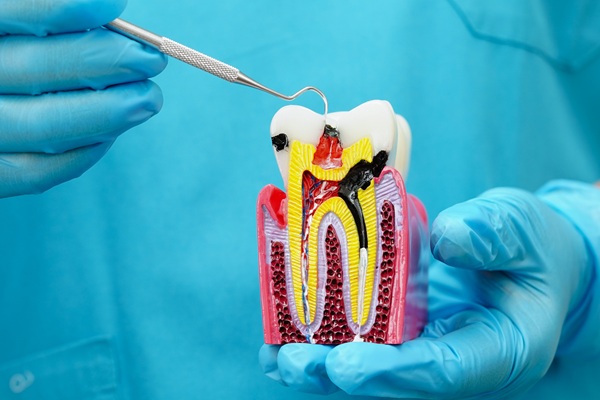What To Expect During and After a Root Canal

Severe tooth decay or damage is often treatable through root canal therapy. Despite its reputation, undergoing a root canal is similar to filling a cavity and is generally no more uncomfortable. Learning about the procedure and the recovery process can help alleviate concerns, helping patients see the benefits of preserving their smile with a root canal.
What is a root canal?
A general dentist recommends a root canal when the inner pulp of a tooth becomes inflamed or infected. Common causes of these conditions include deep decay, cracks, or injury. If left untreated, the inflammation can worsen, or the infection can spread to surrounding tissues. Both can result in further discomfort and potential complications. However, a root canal allows the dental provider to remove the source of the problem and protect the integrity of the tooth.
What to expect during a root canal
A root canal has several steps. The first few involve preparing the tooth and ensuring comfort throughout the procedure. A general dentist will likely recommend local anesthesia to numb the area and ensure the rest of the procedure is painless.
The next step is to drill into the tooth to access the problematic pulp tissue. The dental provider will then carefully remove the infected or inflamed pulp, eliminating bacteria and debris. Once the inside of the tooth is cleaned and shaped, they will fill and seal the area with a rubber-like material called gutta-percha. This seal protects the tooth from further damage and maintains its structural integrity. Lastly, a temporary filling or crown is placed to protect the tooth while a permanent restoration is prepared.
What to expect after root canal therapy
Root canals can be completed in a single appointment. Here is what to expect in the following days and weeks:
Recovery
Recovery from a root canal is typically quick, with most patients resuming normal activities within a day or two. Mild soreness or sensitivity is common but generally subsides within a few days. Over-the-counter pain relievers and any aftercare recommendations from the dentist help manage these temporary effects.
Maintaining good oral hygiene is also an essential part of the recovery process. Brushing, flossing, and rinsing with an appropriate mouthwash support healing and reduce the risk of complications. Make sure to avoid hard or sticky foods immediately after the procedure to protect the treated tooth and surrounding areas.
Follow-up care
A follow-up visit is often necessary to ensure that the tooth is healing properly and that the final restoration fits perfectly. The general dentist will examine the tooth and place the permanent crown or filling, which restores the tooth's function and appearance. This step completes the process, as well as allows the tooth to blend seamlessly with the rest of the smile.
Visiting the dentist every six months after a root canal promotes long-term oral health. These checkups provide an opportunity to monitor the treated tooth and address any potential issues before they become problematic. With proper care, a tooth restored through a root canal can last a lifetime.
Find out more about root canals
A root canal is a proactive step toward maintaining oral health and preventing complications. If you are experiencing any signs of severe tooth decay or infection, contact b Dental Spa at Bogota for prompt treatment. We can evaluate the tooth to determine whether a root canal may be necessary.
Request an appointment here: https://bogota.bdentalspa.com or call b Dental Spa at Bogota at (201) 343-6770 for an appointment in our Bogota office.
Check out what others are saying about our dental services on Yelp: Root Canal in Bogota, NJ.
Related Posts
A root canal is a procedure that dentists can perform to stop infection inside a tooth by removing its pulp, or the material in the center of a tooth. Since teeth are made of enamel and other hard materials, they do not swell up to warn you that an infection might be present, like other…
Root canal infections occur when bacteria reach the central canals of your teeth due to exposure from taking a blow to the mouth or tooth decay. A root canal is a procedure performed for the purpose of repairing or salvaging a seriously decayed tooth or a tooth that has been severely infected. During a root…
A broken or lost restoration can cause unexpected pain, stress, and difficulty eating or speaking, which is why many people contact an emergency dentist for quick relief. Whether a crown has fallen out or a filling has fractured, prompt attention helps prevent further damage, infection, or discomfort. Seeking help right away protects the surrounding teeth…
An emergency dentist may be necessary. The tissue that makes up your gums does not grow back, so it can be scary in the unlikely event that you get lacerated on your gums. To clarify, a cut that comes from everyday activities such as flossing, brushing your teeth too vigorously, or biting down wrongly on…
